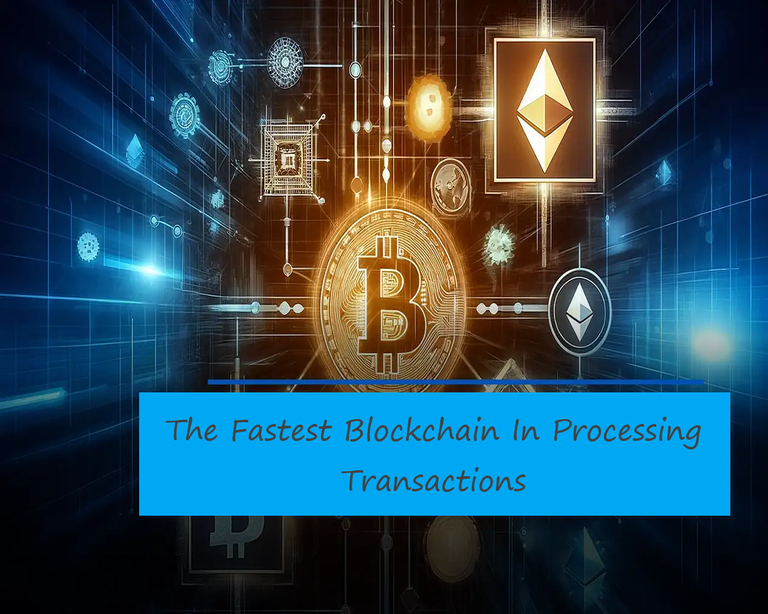
Blockchain technology was introduced to the world with the emergence of Bitcoin in 2008; An innovation that completely changed the way the world thought about online transactions. Cryptocurrencies that have been created to date do not have the ability to cover all three criteria of security, scalability and decentralization in one network at the best possible level. For example, according to most experts, the best network that has been able to maintain security and decentralization at the same time is the Bitcoin blockchain, which is weak in scalability. On the other hand, some blockchains like the Solana network are stronger in scalability, but their security features are weaker than Bitcoin. In this post, I will introduce 10 of the fastest blockchains in the world of cryptocurrencies.
The importance of speed in blockchain
One of the main goals and applications of blockchain technology is to use it in international payments and online transactions. Traditional systems that provide this type of service are providers such as PayPal, Visa Card, Mastercard, etc. In order to be able to compete with and replace traditional providers, projects based on blockchain technology must improve their scalability and be at least as fast as traditional systems in processing and carrying out transactions; Therefore, scalability is very important in blockchain-based networks.
In addition to security, the speed of a blockchain, which actually refers to the speed of data transfer from the source to the destination of a transaction, is one of the main parameters; The faster a blockchain is, the faster it can process and verify transactions. In general, fast blockchains provide users with various benefits, including the following:
- Scalability and more usability: Scalability and speed are two related factors in blockchain. The faster a blockchain is, the more transactions it can perform per second, and thus the power to process more complex applications and calculations.
- User Experience: If the speed of the blockchain is slow, the time required for the transaction to be confirmed by the network will be longer, which is likely to cause dissatisfaction among users. Providing a fast and reliable user experience for users is one of the important factors in blockchain adoption. The high speed in verifying and executing transactions encourages users to participate in and use the blockchain ecosystem.
- Better competition with other technologies: In the information age, the competition between technologies is fierce. Blockchain-based systems must be able to provide high speed that can compete with other similar technologies and services.
Introducing the fastest blockchains in 2024
All blockchains introduced to date challenge a concept called the "blockchain triad," which refers to the intersection of three criteria: security, scalability (speed), and decentralization. In other words, in theory a blockchain is considered very strong when it provides security, decentralization and scalability at the same time, but in practice this situation is very difficult to implement and has not happened in the best way so far; That is, every cryptocurrency project that has been created so far, if it has a very high level of decentralization, it has not worked in the best possible way in one of the other two cases.
The cryptocurrency world's first transaction on the Bitcoin blockchain took 10 minutes to be confirmed. Although this time was fast compared to the traditional banking transaction system, this time increased as the popularity of digital currencies increased and the number of users and network congestion increased. Some Bitcoin transactions can take up to an hour to be confirmed when the network is busy, which has reduced the efficiency of its blockchain. Even though the Ethereum blockchain has improved its scalability to some extent compared to Bitcoin, it still faces a low speed in processing transactions. Various solutions, including the use of Ethereum's second layer, have been proposed in this regard.
Overall, although Bitcoin and Ethereum are still one of the best blockchains in terms of security and decentralization, many cryptocurrency projects have emerged that are faster than these two; So that some of them have reduced the speed of processing and verifying transactions to one or more seconds. In this section, I will introduce 12 of the fastest blockchains in the world of cryptocurrencies. You can see the practical and tested processing power of each of these cryptocurrencies until the time of writing this text in the table below.
| Name | TPS | Confirmation (in seconds) |
| Bitcoin | 7 | 600 - 3000 |
| Ethereum | 15 | Almost 300 |
| Solana | 1504 | Less than 1 |
| Sui | 854 | Less than 1 |
| BSC | 378 | 3 - 5 |
| Polygan | 190 | 2 - 3 |
| TON | 175 | Less than 5 |
| TRON | 160 | Less than 10 |
| NEAR Protocol | 118 | 10 - 15 |
| Avalanche | 89 | 1 |
| Cronos | 72 | 10 - 20 |
| Gnosis | 66 | Less than 30 |
| Fantom | 59 | 1 |
| Arbitrum | 59 | Less than 60 |
1- Solana: 1504 transactions per second
The Solana (SOL) cryptocurrency blockchain is one of the fastest and most scalable blockchain networks in the world. This project can process up to 65,000 transactions per second by optimizing algorithms such as Proof of History (PoH) or Proof of Stake (PoS); A feature that makes Solana's transaction confirmation time typically less than one second. Solana blockchain is considered one of the best networks for implementing smart contracts and decentralized applications due to its high power in transaction processing.
2- Sui: 854 transactions per second
Sui Cryptocurrency (SUI) is known as one of the high-speed layer one blockchains, which is very similar in design to Ethereum; A project that is very suitable for processing instant transactions with low transaction fees. To increase the speed of transaction processing, Sui blockchain is equipped with the technology of executing parallel transactions; This makes the network of this cryptocurrency capable of processing up to 120,000 transactions per second. Sui blockchain is very useful in DeFi and non-exchangeable tokens.
3- Binance Smart Chain: 378 transactions per second
Binance Smart Chain (BSC) blockchain is a parallel blockchain network with Binance Chain, the main blockchain of the Binance Coin (BNB) cryptocurrency, which was built in order to improve the scalability and speed of transactions in the blockchain of this cryptocurrency. Binance Smart China uses the Proof of Staked Authority (PoSA) algorithm; Taking advantage of this mechanism in Binance Smart China makes the process of verifying transactions usually done in 3 seconds. This blockchain is attractive to developers and users who are looking for lower cost and high speed.
4- Polygon: 190 transactions per second
The Polygon Project (MATIC) is a second layer blockchain launched on the Ethereum blockchain as a scalability solution. By using side chain technology, Polygan provides the possibility of increasing the speed of transactions on the platform of the Ethereum network up to the processing power of 7 thousand transactions per second (TPS). This cryptocurrency provides a platform for DApp developers to transact at high speed and low cost, while benefiting from the security of the Ethereum network and other advantages of its main layer chain. Currently, a large number of game industry platforms, decentralized exchanges and DeFi applications cooperate with the Polygon network.
5- Ton Network (TON): 175 transactions per second
The cryptocurrency associated with the famous Telegram messenger, Toncoin, has a very fast blockchain-based network; The blockchain of this cryptocurrency, which is called TON (derived from Telegram Open Network), has a main chain and a large number of side chains. Launched in 2017, Tone Blockchain is much more scalable than mainstream blockchains such as the Bitcoin and Ethereum networks. The project claims to be able to process millions of transactions per second by combining several technologies. Therefore, the founders of TON Coin say that the TON network can compete with companies such as Visa and Mastercard in the speed of processing and verifying transactions. Then, in this way, access to the web3 space will be faster.
6- Tron: 160 transactions per second
Tron (TRX) is also among the projects whose blockchain is significantly known for its scalability; The decentralized and open source blockchain of this project was introduced and launched in 2017 by one of the crypto industry activists named Justin Sun. The "Deputized Proof of Stake" (DPoS) consensus mechanism used in this network, along with some other technologies, make Tron blockchain much more scalable than Ethereum; so that it can process 2000 transactions per second. This feature of the Tron network attracts developers to build new dApps or decentralized exchanges (DEX) on the Tron network.
7- NEAR Protocol: 118 transactions per second
NEAR Protocol (NEAR) is one of those cryptocurrency projects that was introduced at the time of launch as a competitor to Ethereum in terms of scalability and low transaction fees. The NEAR network is equipped with a special type of sharding technology (dividing the network into smaller components) to increase the scalability and speed of transaction processing in its blockchain. The sharding used in the NEAR blockchain, called Nighshade, can increase the processing power of the network up to 100,000 transactions per second; At the same time, the Nighshade solution allows for a significant reduction in transaction fees.
8- Avalanche: 89 transactions per second
The Avalanche Cryptocurrency (AVAX) blockchain is a unique and scalable network called the Avalanche Network that uses its proprietary Proof-of-Stake consensus algorithm. This network actually consists of three main blockchains: exchange chain (X-Chain), smart contract chain (C-Chain) and platform chain (P-Chain), which help the network in solving scaling problems and transaction fees. Avalanche blockchain can process up to 4,500 transactions per second by dividing the overall tasks of the network in each of the aforementioned blockchains, and the confirmation time of each transaction can reach one second. Avalanche is suitable for implementing smart programs and providing financial services in a centralized or decentralized manner.
9- Cronos: 72 transactions per second
The Cronos Network (CRO) was launched as an "Interoperable Blockchain"; So that it simplifies the possibility of transferring cryptographic programs and assets from different blockchain chains. At the same time as low transaction fees, this network has prioritized fast throughput and reducing the final time of transaction verification. The Cronos blockchain operates as an Ethereum Virtual Machine (EVM) compatible chain and is enhanced with support for inter-blockchain communication (IBC) networks based on the Cosmos SDK. This integration allows developers to build and run dApps on a platform that relies on the EVM infrastructure.
10- Gnosis: 66 transactions per second
The Gnosis project (GNO) acts as an "Execution Layer" chain in the Ethereum virtual machine. The network uses the stablecoin xDAI (xDAI), a derivative of Dai, which is itself a stablecoin pegged to the US dollar, for transactions and payments. The security of the Gnosis network is ensured by the Gnosis Beacon Chain (GBC) mechanism, which is a variant of the proof-of-stake consensus mechanism used in the Cardano and Solana projects; Users share GNO tokens to participate in validating network transactions and receive additional GNO rewards to help secure the network. The blockchain of this cryptocurrency can process 500 transactions per second.




